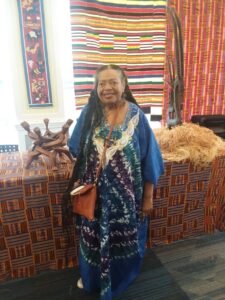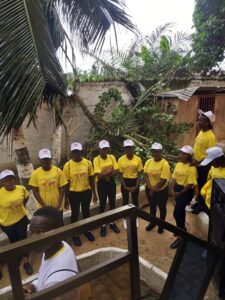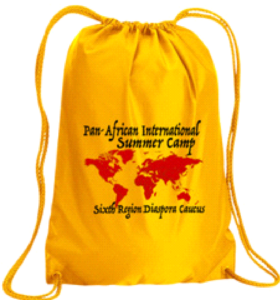 SRDC Summer Cultural Exchange Program
SRDC Summer Cultural Exchange Program
A Summer Camp in Support of the Liberia Library Project
Produced and Sponsored by
Sehwah-Liberia
and the
Sixth Region Diaspora Caucus (SRDC)

Mama Maisha Washington.

Madame Louise Siaway.
The SRDC Summer Cultural Exchange Program, a virtual summer camp that was held from July into August of 2020, was the brainchild of Madame Louise Siaway, founder of Sehwah-Liberia, and Mama Maisha Washington of SRDC and the Maryland Council of Elders. This project is a major part of the legacy of Mama Maisha, who sadly transitioned to the Honored Ancestors in October 2020.
Overview
The Liberian Summer Cultural Exchange Program will recruited 84 students, of which about a dozen from the Maryland (United States) area and another 30 to 40 living primarily in the area of Monrovia, Liberia finally participated. The idea was to allow students from the United States and from West Africa to learn together, interact with each other and thus learn about each other’s cultures as they learned specific subjects in class.

Several of the Summer Camp students in Liberia.
This cultural interaction was designed to help broaden the students’ view and vision of Africa, leading to more effective communication, along with developing skills in project management, compromise/consensus, negotiation, decision making and problem solving.
The students who complete this summer program successfully would then become a part of the first phase of building the Library in Monrovia, Liberia (scheduled for completion by the year 2027), known elsewhere on this site as the Liberia Library Project. The Library will be the cornerstone of information accessible to Africans around the world in search of our common history and culture.
Required courses for all students included Coding, Swahili and West African Foodways (Cooking).
Specialized classes, from which the students could choose a preferred specialty, included:
· AFRICA – Geography/Archaeology: A geographical mapping of Africa, including all physical features of the continent, all the natural resources, and exploration of archaeological digs that expose our long history on the planet, creating a database of their discovery and
a virtual exhibit of the artifacts, natural resources, physical features of Africa and the historical story of our homeland including a written narration and a video of the team explaining their discoveries.
· ORAL HISTORY: Learning how to do historical research and document the histories of the main ethnic groups of Liberia, producing oral tapes and videos for exhibits about the people of Liberia.

All students received a Summer Camp Duffel Bag.

All students received a Summer Camp T-Shirt.
· LINGUISTICS: Beginning the process of researching and documenting all of the African languages spoken in Liberia, producing a book for younger children, oral tapes and videos of conversations.
· CULTURE – Art / Music: Researching and documenting all forms of art, music and drama found in Liberia, including researching and collecting all instruments designed and developed in Liberia/Africa.
· PROJECT MANAGEMENT – Engineering / Architecture / Materials: Conducting research of the engineering needs, learning how architecture designs are developed and ascertaining the materials needed for building the future library.
· ENVIRONMENT – Water, Soil, Sewage: Conducting research on the three crucial elements needed to have a fully
functioning facility, from soil quality and depth studies to determinations of access to water and sewage, as well as
the impact of earthquakes and seasonal (rainy, dry) conditions on soil quality.
· ASTRONOMY / IT: Studying and researching the night sky and African stories related to it. Building a telescope and creating an astronomy show for the planetarium.
Students were also given the option to choose any of three additional classes: Yoga, Zumba and/or African Dance.
All students who participated received a Summer Camp T-Shirt, a Summer Camp Cap and a Summer Camp Duffel Bag in addition to the instruction they received and the memories of an enjoyable summer program. We hope to be able to duplicate the effort in following summers to properly honor Mama Maisha and her great work as an educator of Afrikan children on both sides of the Atlantic.
